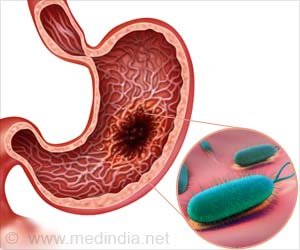Promise of Pyrvinium, the antihelminthic Drug in Stomach Cancer Prevention

Choi has published a series of studies that have delved into the mechanisms by which gastric cancer forms through dysplasia, the abnormal growth or development of cells. Globally, gastric cancer is the fifth most common cancer and the third deadliest. The current standard of treatment for gastric dysplasia is limited to endoscopic resection or surgical excision of small lesions.
“Our study suggests that pyrvinium can lead to mucosal recovery from metaplastic and/or dysplastic to normal by targeting a stem cell population through a dual MEK/ERK and STAT3 inhibition,” said Choi, the study’s senior author.
Pyrvinium has been used for over 70 years for intestinal pinworms and has a known safety profile. Recent preclinical studies have reported that the drug can also impede the growth of colorectal, breast, lung, liver and pancreas cancers by inhibiting crucial signaling pathways. Choi’s lab, however, is the first to identify the specific dysplastic stem cells that are a key source of clonal evolution of dysplasia to gastric cancer.
Advertisement
In this latest study, the researchers revealed through scRNA-seq data analyses that pyrvinium targeted the CD133+/CD166+ stem cell populations as well as proliferating cells in dysplastic organoids. The drug also inhibited metaplasia progression to dysplasia and promoted the regeneration of normal gastric mucosa by contributing to an anti-inflammatory microenvironment. This effect suggests a lower likelihood of potential adverse effects on tissue regeneration.
“With the pyrvinium’s possible advantages including its well-characterized lack of side effects, a next step to move forward would be an early phase trial of pyrvinium to reverse the metaplastic gastric mucosa in patients with high-risk precancer with a clinical research group,” Choi said.
The study’s lead authors are Hyesung Kim, PhD, and Bogun Jang, MD, PhD. Other Vanderbilt authors of the study are Changqing Zhang, BS; Brianna Caldwell, BS, MBA; and James Goldenring, PhD, MD. Other collaborators are scientists from Seoul National University College of Medicine.
Reference :
- Targeting Stem Cells and Dysplastic Features with Dual MEK/ERK and STAT3 Suppression in Gastric Carcinogenesis – (https://linkinghub.elsevier.com/retrieve/pii/S0016508523050758)
Source: Eurekalert
Source link
#Promise #Pyrvinium #antihelminthic #Drug #Stomach #Cancer #Prevention



